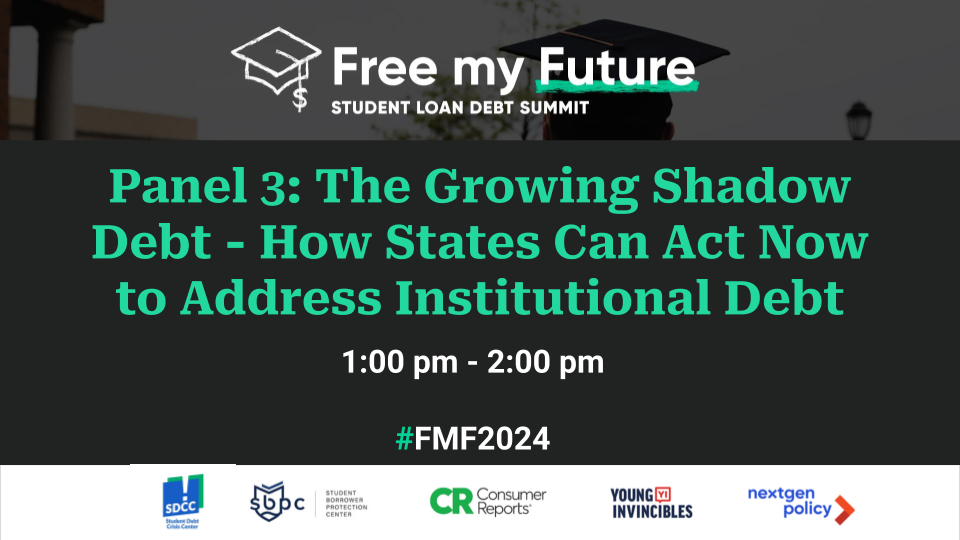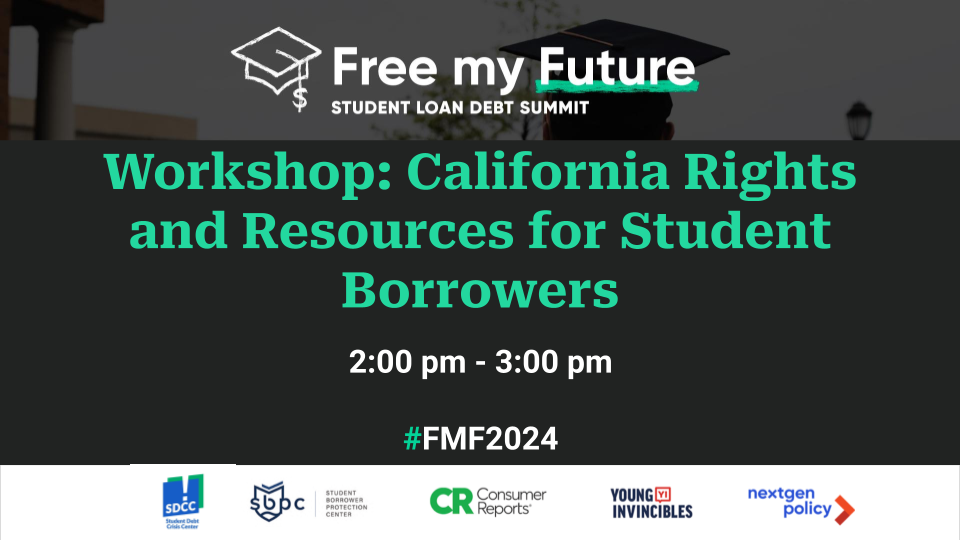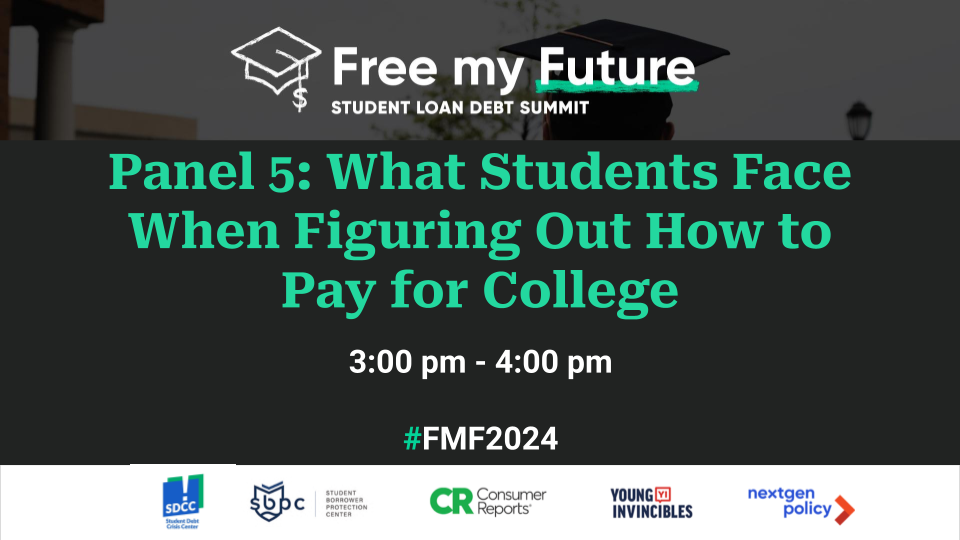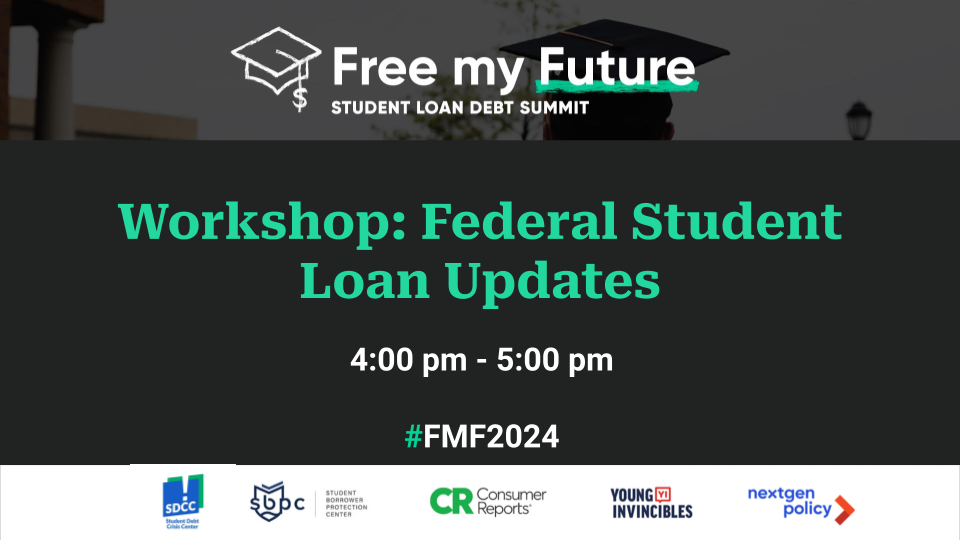FMF 2024 Recordings & Presentations
Opening Keynote Recording
Speakers:
- Clothilde V. Hewlett, Commissioner, California Department of Financial Protection and Innovation
- Blanca Pacheco, California State Assemblymember, AD 64
- Julia Barnard, Private Education Loan Ombudsman, Consumer Financial Protection Bureau
- Arnold Sowell Jr., Executive Director, NextGen Policy
Opening Presentation
Panel 1 Recording
The federal student loan landscape has experienced unprecedented changes over the past four years. Payments for millions of borrowers were paused during the COVID-19 pandemic and then resumed. Over one third of borrower accounts were transferred due to changes in student loan servicers. The Biden-Harris administration has introduced several program improvements, a new payment plan, and debt relief opportunities. Although these changes have benefited millions of borrowers, they have also been routinely challenged by conservative state attorneys general in court, which has blocked access to critical programs and wreaked havoc on the student loan system.
This panel will review the current state of the federal student loan system, efforts to cancel debt and provide affordable repayment options, and the ongoing legal challenges to the Biden-Harris administration’s policies.
Speakers:
- Sabrina Calazans, Managing Director, Student Debt Crisis Center
- Alex Lundrigan, Policy and Advocacy Manager – Higher Education and Workforce, Young Invincibles
- Abby Shafroth, Co-Director of Advocacy, National Consumer Law Center
- Persis Yu, Deputy Executive Director and Managing Counsel, Student Borrower Protection Center
Panel 2 Recording
With a defining presidential election behind us, and as preparations are underway for a second Trump Administration to begin in 2025, millions of student loan borrowers face an uncertain future. With expected significant shifts in policy, the newly elected administration’s priorities will reshape federal student loan programs and debt forgiveness initiatives.
This panel will recap the presidential election outcome and its implications for student borrowers across the United States and the need for state and local leaders to expand protections.
Speakers:
- Natalia Abrams, President and Founder, Student Debt Crisis Center
- Aissa Canchola Bañez, Policy Director, Student Borrower Protection Center
- Kristin McGuire, Executive Director, Young Invincibles
- Mike Pierce, Executive Director, Student Borrower Protection Center
- Arnold Sowell Jr., Executive Director, NextGen Policy
Q+ A Recording
Student loan borrowers are encouraged to join representatives from the Federal Student Aid (FSA) Office from the Department of Education to ask questions about their student loans and get quick answers. FSA is an office of the U.S. Department of Education (ED) and is the largest provider of student financial aid in the nation. At FSA, their more than 1,400 employees help make postsecondary education possible for more than 9.7 million students each year. Attendees should note this is a popular segment of the FMF Summit and are encouraged to continue to communicate with the FSA office at any time regarding your federal student aid account.
Speakers:
- Amy Czulada, Outreach & Advocacy Manager, Student Borrower Protection Center
- Rachel Gittleman, Ombudsman Specialist – State Lead, Federal Student Aid Office
Wellness Moment Recording
We are all living in a stressful time and carrying a student loan is a heavy burden. Take this time to nourish yourself with lunch and join us for a discussion with licensed therapist and fellow student loan borrower, Byran Harnsberger about techniques to support yourself through financial distress.
Speakers:
- Bryan Harnsberger, Psy.D
- Natalia Abrams, President and Founder, Student Debt Crisis Center (moderating)
- Sabrina Calazans, Managing Director, Student Debt Crisis Center (moderating)
Panel 3 Recording
Across California, more than 3.9 million borrowers owe nearly $148 billion in student loan debt. Although state and federal policymakers have taken action to support student loan borrowers, another type of student debt has gone mostly unaddressed: institutional debt. Institutional debts are debts owed by current or former students directly to an institution of higher education. The majority of this debt is incurred when a student unexpectedly withdraws from a course before the end of the term and their school is then required to return federal student aid—such as a Pell Grant and federal student loans—to the federal government. The schools then charge the amount of the returned funds to the student, converting the balance into debts that students owe directly to their school. Since Pell Grants are awarded based on financial need, these debts almost exclusively afflict low-income students—students who are also more likely to be students from racially marginalized communities.
This panel will discuss legislative efforts to address institutional debt. Attendees will learn about AB 1160 (Pacheco) from the last legislative session in California and how policy changes can benefit both students and institutions alike.
Speakers:
- Aissa Canchola Bañez, Policy Director, Student Borrower Protection Center
- Sarah Bouabibsa, West Advocacy Manager, Young Invincibles
- Jonathan D. Glater, Professor of Law, UC Berkeley
- Samantha Seng, Legislative Director & Policy Advisor, NextGen Policy
Panel 3 Presentation
Workshop Recording
The California Department of Financial Protection and Innovation (DFPI) is the state’s consumer protection agency and the go-to state agency for student loan borrowers with complaints about their servicer as well as to receive timely resources. During this hour, California’s first Student Loan Ombudsperson, Celina Damian, will present information about what rights California student loan borrowers have in the state, what DFPI services and programs are available to borrowers, including a new network of non-profit organizations that can provide one-on-one assistance to student loan borrowers, as well as tips on avoiding scams.
Attendees are encouraged to hear directly from Celina and get connected with DFPI for reliable information about student loans, resources as well as ask questions to successfully navigate the student loan programs.
Speaker:
- Celina Damian, California Student Loan Servicing Ombudsperson, Department of Financial Protection and Innovation
Workshop Presentation
Panel 5 Recording
The burden of student debt falls inequitably on students who have been historically left out of higher education, including low-income students and students of color. To curb borrowing and close equity gaps in college affordability, California and other states can take several steps including strengthening need-based financial aid to better support students’ total college costs. Join this panel of students and policy experts for a discussion about the choices and challenges students face as they piece together how to pay for college, including the serious consequences of our current debt-financed higher education system and its impact on students’ higher education success. Attendees will also hear from students and learn about policy reforms and practices the state can implement to improve college affordability and degree attainment for all Californians.
Speakers:
- Althea Ito, Organizing Director for UC Berkeley, University of California Student Association
- Parshan Khosravi, California Policy Director, uAspire
- Viviana Martin, Senior Policy Analyst, The Education Trust-West
- Adrian Sanchez, Vice President of Legislative Affairs, California State Student Association
- Laura Szabo-Kubitz, Senior Policy Advisor, The Institute for College Access and Success
Panel 5 Presentation
Workshop Recording
During his administration, President Biden has tried to enact several reforms to the federal student loan system to fix the broken system, and provide relief to student loan borrowers who have earned student loan forgiveness but have missed out due to technical errors and deceptive student loan servicer practices. Many of these efforts have been tied up in legal challenges leaving borrowers in repayment limbo. Join this workshop to learn about what has changed for borrowers’ repayment options and scams to look out for. Borrowers will also have a chance to ask questions to help them figure out their student loan debt situation.
Speakers:
- Natalia Abrams, President and Founder, Student Debt Crisis Center
- Sabrina Calazans, Managing Director, Student Debt Crisis Center
Workshop Presentation




